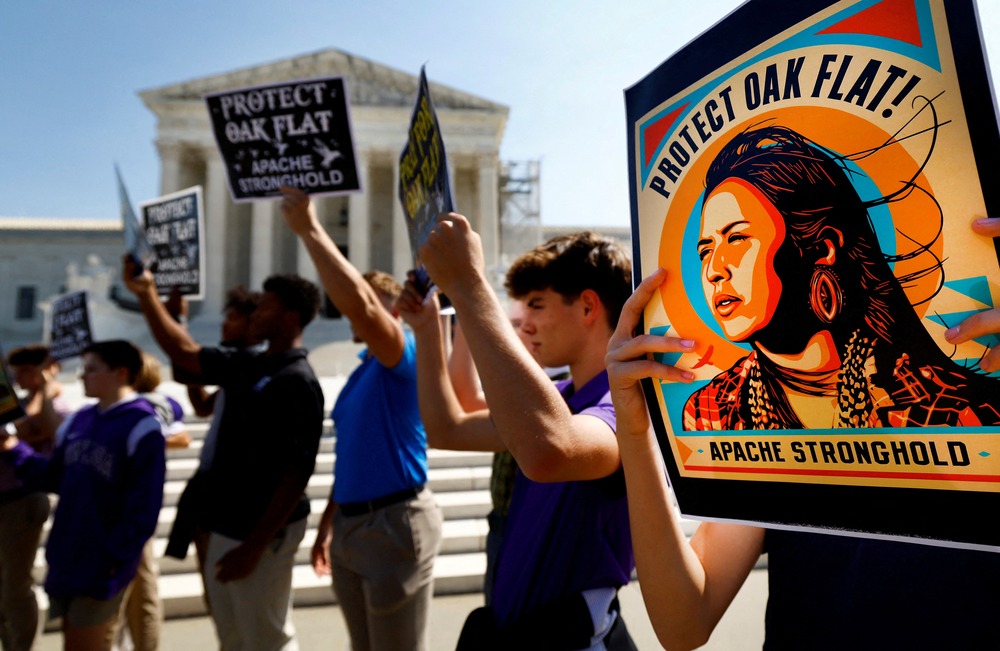Indigenous coalition asks Supreme Court to stop mine threatening sacred site
A coalition of Western Apache people, along with other Native American and non-Indigenous supporters, under the banner of the non-profit Apache Stronghold, asked the U.S. Supreme Court Sept. 11 to protect their sacred site at Oak Flat, Arizona, from destruction by a copper mining giant after a federal appeals court rejected their request. Oak Flat in Tonto National […]



A coalition of Western Apache people, along with other Native American and non-Indigenous supporters, under the banner of the non-profit Apache Stronghold, asked the U.S. Supreme Court Sept. 11 to protect their sacred site at Oak Flat, Arizona, from destruction by a copper mining giant after a federal appeals court rejected their request.
Oak Flat in Tonto National Forest — about 70 miles outside of Phoenix — is considered a sacred site by the region’s Indigenous peoples and is on the National Register of Historic Places. However, after the discovery of copper deposits on the land, in December 2014, Congress authorized the U.S. Forest Service to swap the land for other sites with Resolution Copper, a foreign-owned mining company, and lifted a mining ban on Oak Flat.
An environmental impact report mandated by the National Environmental Protection Act estimated that mining the site would result in a crater nearly 2 miles in diameter and about 800 to 1,000 feet deep.
In March, a divided 9th Circuit Court of Appeals rejected a request in Apache Stronghold v. United States, to stop the federal transfer of Oak Flat to Resolution Copper. Apache Stronghold argued the site has long been home to Indigenous religious ceremonies and mining the land would destroy it. The appellate court ruled the Religious Freedom Restoration Act did not protect the group, as they were not being coerced by the government to violate their beliefs.
The group previously signaled it would ask the Supreme Court to intervene, arguing the destruction of their religious site, which cannot be replaced, would place a substantial burden on their religious practice, in violation of that law.
“The question in the case is whether the complete destruction of a sacred site where religious practices take place — that can’t take place anywhere else — whether that is a burden on religious exercise that triggers religious freedom protections,” Joe Davis, senior counsel at Becket, a Washington-based religious liberty law firm representing Apache Stronghold, told OSV News.
Davis cited the lower court’s closely divided ruling as a reason the Supreme Court should consider the case.
“Five judges dissented and said that this was a tragic mistake — that, of course, it’s a substantial burden to completely destroy a sacred site — and so, the government needs to be able to provide a really good justification for doing that,” he said.
The case is reminiscent of “incursions on Native American religious freedom in the 19th century,” Davis said.
“But today we have a federal law called the Religious Freedom Restoration Act, a statute passed by Congress intended to provide very broad protection for religious freedom, and it has provided very broad protection for lots of different groups since it was enacted in the 1990s,” Davis said. “This case is really sort of the first major test of whether that statute protects Native American religious freedom.”
Wendsler Nosie Sr. of Apache Stronghold said in a statement, “Oak Flat is our Mt. Sinai — the most sacred place where generations of Apache have come to connect with our Creator, our faith, and our land.”
“We pray the Justices will protect Oak Flat,” he said, “and ensure that our place of worship is not treated differently simply because it lacks four walls and a steeple.”
In a statement responding to Apache Stronghold’s certiorari petition, a Resolution Copper spokesperson argued the case “does not present any question worthy of Supreme Court review” and that the circuit court correctly applied “well-established Supreme Court precedent.”
“This case is about the government’s right to pursue national interests with its own land — an unremarkable and longstanding proposition that the Supreme Court and other courts have consistently reaffirmed,” the spokesperson said, arguing the mining project “is vital to helping secure America’s energy future with a domestic supply of copper and other critical minerals.”
The statement argued the project has “significant community support” and would add $1 billion a year to Arizona’s economy.
“Our dialogue with local Native American Tribes and communities will continue to shape the project, building on more than a decade of Tribal and government consultation and collaboration,” the spokesperson added.
A broad coalition of religious groups — Muslim, Jewish, and Sikh, as well as Christian groups, including Catholic ones, have supported the Apache group’s case. The Notre Dame Law School Religious Liberty Clinic has also supported the case.
It remains to be seen if the high court will take up the case, but if so, it would likely make that decision known in the fall.













